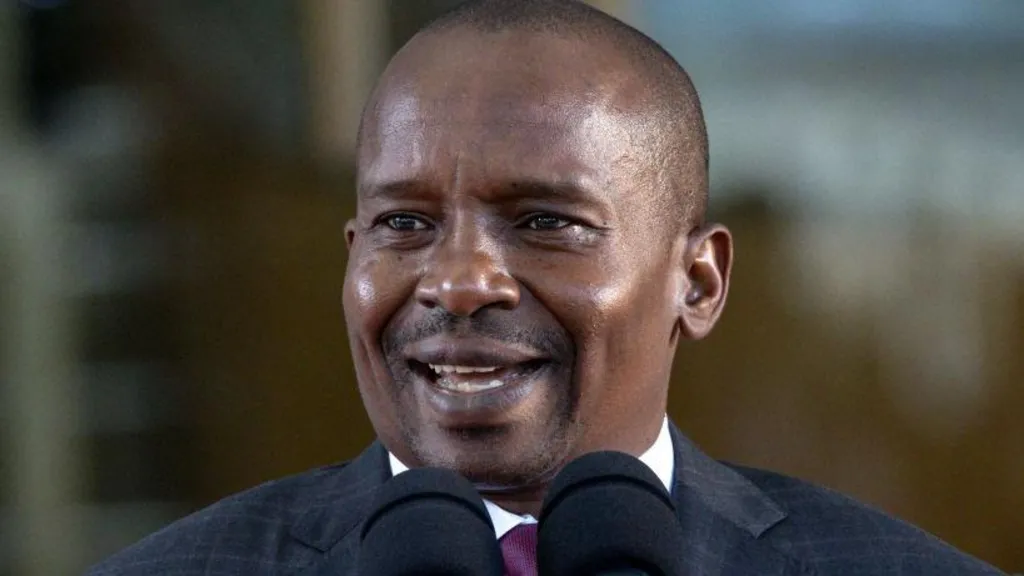Kenya court paves way for new deputy president
3 min read

In a significant political development, Kenya’s High Court has removed a blockade preventing the swearing-in of Kithure Kindiki as the new deputy president, following the impeachment of his predecessor, Rigathi Gachagua. This unprecedented turn of events has captured the attention of the nation, as it marks a crucial moment in Kenya’s political landscape.
Gachagua was ousted from office two weeks ago after parliament approved an impeachment motion with overwhelming support. This decision came after a series of controversies surrounding Gachagua’s conduct while in office, including allegations of inciting ethnic divisions and violating his oath of office. His impeachment was notable, making him the first deputy president to be removed under Kenya’s revised 2010 constitution.
Following Gachagua’s removal, President William Ruto quickly nominated Kithure Kindiki, the former law professor and current interior minister, to take his place. However, Gachagua challenged his ousting in court, claiming that it was politically motivated and that he had been denied a fair hearing. Although parliament had confirmed Kindiki’s appointment, the court initially placed a hold on his swearing-in pending the outcome of Gachagua’s legal challenges.
On Thursday, a three-judge panel ruled that the order preventing Kindiki’s swearing-in was lifted, asserting that an extended vacancy in the deputy president’s office was “untenable.” Justice Anthony Mrima emphasized the importance of continuity in leadership, stating, “Public interest demands that the office of the deputy president should not remain vacant.”
Despite the court’s ruling, Gachagua’s legal team announced intentions to appeal the decision, maintaining that the grounds for his impeachment were unfounded and that he had not been given a fair chance to defend himself during the process. The court, however, allowed Gachagua’s challenge to the impeachment itself to continue, indicating that the legal battle is far from over.
Gachagua, often referred to as “Riggy G,” is a wealthy businessman hailing from the influential Mount Kenya region, a pivotal voting bloc that supported Ruto during the 2022 elections. His removal from office has stirred discussions about political loyalties and the dynamics within the ruling party.
Kindiki, who is also from the Mount Kenya region, had been considered a frontrunner to succeed Gachagua. At 52, he brings a blend of academic and political experience, having previously served in various capacities within the government. His appointment is seen by many as an opportunity for a fresh start in the deputy president’s office, particularly following the turmoil surrounding Gachagua’s tenure.
The fallout from Gachagua’s impeachment highlights growing divisions within the ruling party, exacerbated by widespread public discontent over unpopular tax hikes that sparked deadly demonstrations in June. This internal strife within the Kenya Kwanza coalition reflects deeper societal frustrations, particularly as economic pressures continue to mount for ordinary citizens.
As the country awaits the resolution of Gachagua’s appeal and Kindiki’s swearing-in, political analysts are keenly observing the implications for Kenya’s governance. The appointment of a new deputy president amidst such controversy raises questions about stability and the future direction of Ruto’s administration.
In the coming days, Kindiki’s leadership will be closely scrutinized as he steps into a role laden with expectations for effective governance and a commitment to unity within the ruling party. His ability to navigate the political landscape will be crucial, especially in light of the challenges that lie ahead for Kenya as it grapples with economic recovery and public dissatisfaction.
Overall, the lifting of the court order not only clears the way for Kindiki to assume office but also sets the stage for a renewed focus on governance and accountability in the wake of a tumultuous political period. As Kenya moves forward, the ramifications of these events will undoubtedly shape the nation’s political narrative for years to come.